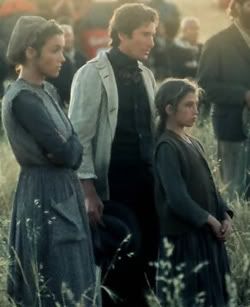"Some people need more than they got, other people got more than they need. Just a matter of gettin' us all together."
 I've been in love with David Gordon Green's George Washington since I saw it probably over a year ago. I saw it twice the day I rented it and I haven't seen it since, but I haven't been able to stop thinking about it. I probably think about it at least once a day. It ruined other movies for me for a little while. I've cooled down now, but I still consider it one of the better films I've seen in my lifetime. Imagine my surprise when, after doing a little bit of reading and talking with various people, I find out that apparently another guy had been doing similar stuff nearly three decades earlier. Every article I ever read on George Washington mentioned Terrence Malick's name, a name I'd heard before but didn't bother looking into for some reason, and the influence that it took from his work. Right then I knew I had a guy whose filmography I needed to start looking into real quick-like.
I've been in love with David Gordon Green's George Washington since I saw it probably over a year ago. I saw it twice the day I rented it and I haven't seen it since, but I haven't been able to stop thinking about it. I probably think about it at least once a day. It ruined other movies for me for a little while. I've cooled down now, but I still consider it one of the better films I've seen in my lifetime. Imagine my surprise when, after doing a little bit of reading and talking with various people, I find out that apparently another guy had been doing similar stuff nearly three decades earlier. Every article I ever read on George Washington mentioned Terrence Malick's name, a name I'd heard before but didn't bother looking into for some reason, and the influence that it took from his work. Right then I knew I had a guy whose filmography I needed to start looking into real quick-like.Unfortunately, I didn't do it real quick-like. I did it real slow. Regardless, I've delved into Malick's work now and I can say this: Days of Heaven is a hell of a thing. I unfortunately had to watch my school's fullscreen VHS copy in the media center so I didn't get the whole picture, a better viewing is probably due soon, but regardless of the inferior version I had, it's still got to be one of the most gorgeous films I've ever seen. I guess Malick likes to do this thing where he "discovers" his movies as he goes along, I'm assuming something along the lines of what Wong Kar Wai does with his films, and so when you read the screenplay of Days and compare it to the finished product, you find that they're significantly different. I like it when filmmakers can pull this approach off, because I think it results in some truly wonderful moments. I saw Los Angeles Plays Itself today and I recall the narrator saying that if documentaries can be admired for their dramatic qualities, there is no reason for a narrative film to not be admired for the documentary-like qualities it contains. I think that these are the moments that truly make Days of Heaven a great film. The film will cut away from the primary action of the story to capture wheat swaying in the wind or some people dancing around a fire, the idea being that all of these things are significant. All of them are a part of the story, and by taking a look at these things, the film becomes less narrative and more experiential. This film captures a time, a place, people. It's more than just a story. Watching it often feels like watching a poem or a memory.
Labels: days of heaven, terrence malick


